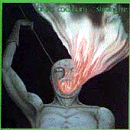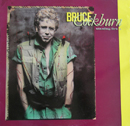

 |
 |
| (U.K. Spindrift Records issue of Stealing Fire from 1984) |
-- from "The Social Commentaries of Bruce Cockburn" by J.D. Considine, Sun Pop Music Critic, Baltimore Sun, 18 March 1988. Submitted by Nigel Parry.
-- from "Cockburn sings with a conscience", by Mary Campbell, 10 April 1989, Marin Independent Journal (Associated Press credit). Submitted by Bobbi Wisby.
James Jensen: The album "Stealing Fire" saw acoustic guitar creep back into prominence on several tracks what brought that about?
BC: Some of those pieces I wrote on acoustic guitar, if I happen to
be holding an electric guitar in my hand when I get an idea it'll
probably end up on the record. A lot of the songs on my current
album (tentatively titled "Dart to the Heart") were written in hotel rooms and dressing rooms on the last tour so they're written on
acoustic guitar because that's what I had at the time. When I'm at
home and I have my stuff all set-up and plugged in I might write more
on the electric. A lot of "Big Circumstance" was written traveling and that's why the acoustic had a bigger role again on that record.
-- from an Interview by James Jensen at Sunset Sound, Los Angeles, circa Spring 1993.